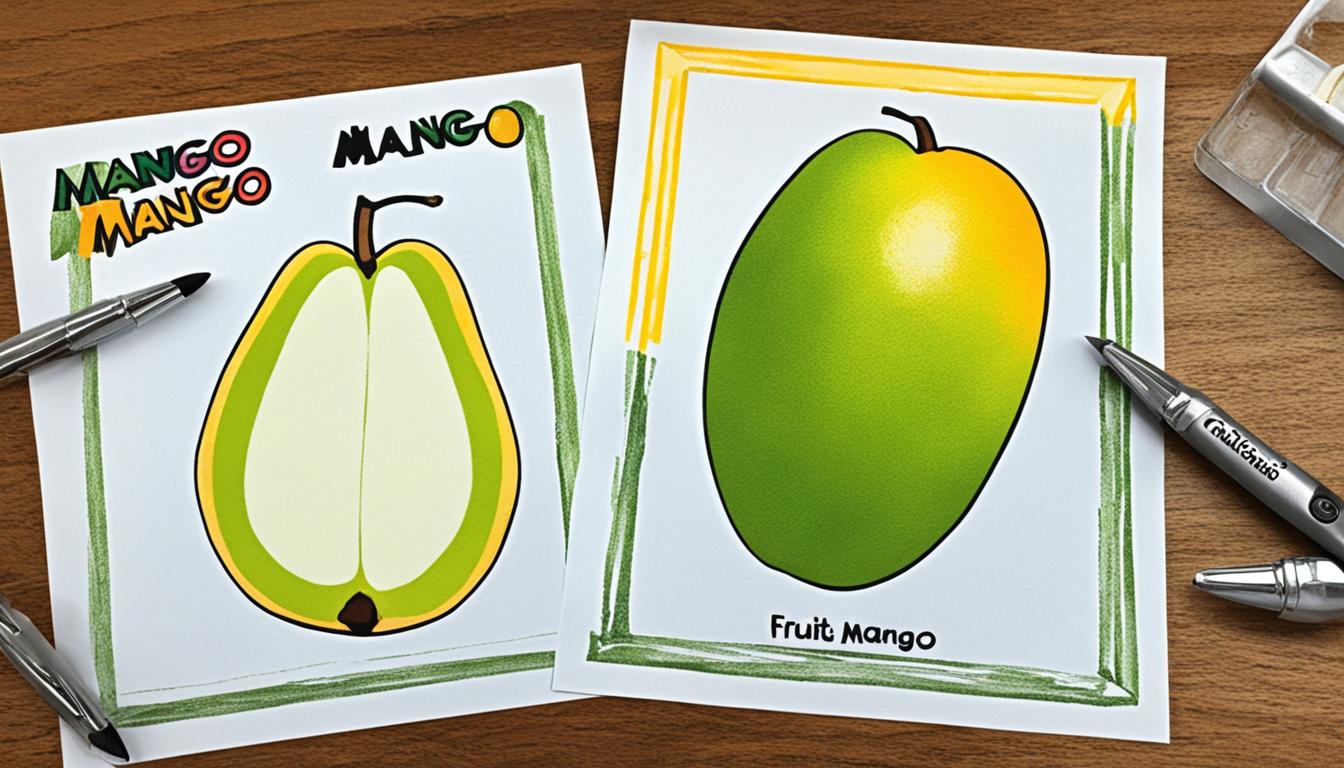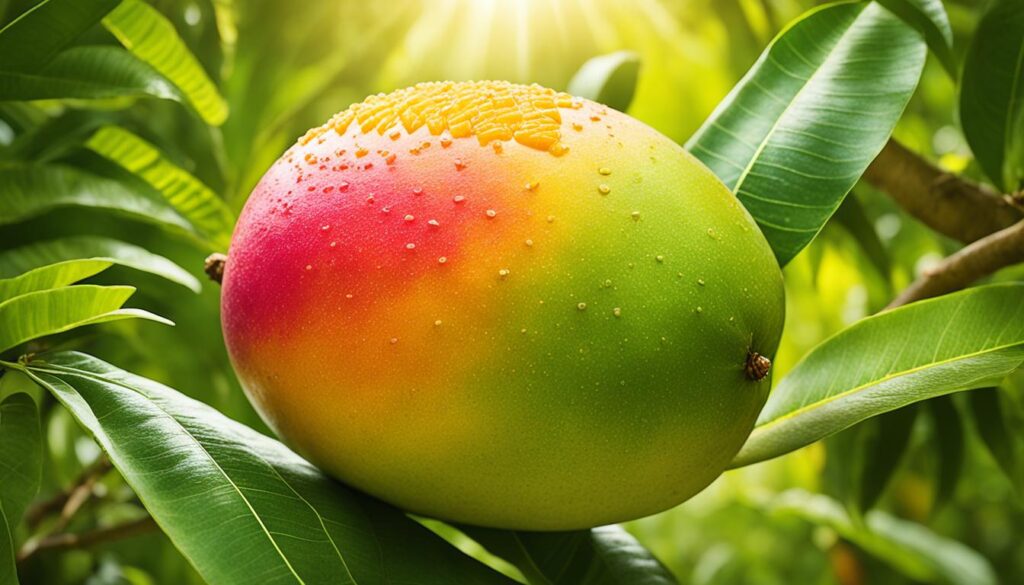Is Mango a Citrus Fruit? Uncover the Truth!

Welcome to our article where we will delve into the fascinating world of fruits and answer the burning question: Is mango a citrus fruit? 🥭🍊
As we explore the classification of fruits and compare the characteristics of mangoes and citrus fruits, we’ll unravel the truth behind this common misconception. So, let’s dive in and discover the facts!
Key Takeaways:
- Mangoes and citrus fruits belong to different taxonomic groups and classifications.
- Citrus fruits have unique taste, appearance, and nutritional properties.
- Mangoes, though similar in some aspects, possess their own distinctive traits.
- By comparing mangoes and citrus fruits, we can clarify their differences and similarities.
- Mangoes fall under the category of tropical fruits, distinct from citrus fruits.
Understanding Fruit Classification
Before we can determine whether mango is a citrus fruit or not, it’s important to understand how fruits are classified. Fruits belong to different categories and taxonomic groups based on their characteristics and botanical classifications.
Categories of Fruits
In general, fruits can be classified into several categories based on their structure and development:
- Simple Fruits: These fruits develop from a single ovary, such as berries, drupes, and pomes.
- Aggregate Fruits: These fruits develop from multiple ovaries of a single flower, such as raspberries and blackberries.
- Multiple Fruits: These fruits develop from a cluster of flowers, with each flower producing a small fruit that fuses together, such as pineapples and mulberries.
Within these categories, fruits can further be classified into specific taxonomic groups based on their botanical characteristics.
Taxonomy of Mangoes
The taxonomic classification of mangoes is as follows:
| Domain | Kingdom | Order | Family | Genus | Species |
|---|---|---|---|---|---|
| Eukarya | Plantae | Sapindales | Anacardiaceae | Mangifera | Mangifera indica |
Mangoes belong to the Anacardiaceae family and the genus Mangifera. The most common species of mango is Mangifera indica.
Understanding the taxonomy of mangoes can provide insights into their botanical classification and relationship with other fruits.
Fruits come in a variety of shapes, sizes, and flavors. Understanding their classification can help us better appreciate the diversity and unique characteristics of different fruits, including mangoes.
Characteristics of Citrus Fruits
In this section, let’s dive into the unique characteristics of citrus fruits, such as their taste, appearance, and other distinguishing features. By understanding these traits, we can better evaluate whether mango shares similar qualities with citrus fruits.
Taste: Citrus fruits are well-known for their tangy and refreshing flavor profile. They often have a pleasant balance of sweetness and acidity, which gives them their signature taste. From the zesty notes of oranges to the slightly bitter undertones in grapefruits, each citrus fruit offers a distinct and vibrant flavor experience.
Appearance: Citrus fruits are typically characterized by their vibrant colors and spherical shape. Their outer peels range from bright orange, like that of oranges and tangerines, to vibrant yellow in lemons and limes. The peels are textured with a slightly rough or bumpy surface, while the juicy segments inside are deliciously pulpy.
Other Distinguishing Features: Citrus fruits are known for their high vitamin C content, which is essential for supporting a healthy immune system. They also have a fragrant aroma, especially when the rind is gently squeezed or grated.
“Citrus fruits are not only packed with refreshing flavors, but they also offer a wide range of health benefits. From their antioxidant properties to their contribution to collagen production, these fruits are a true powerhouse of nutrients!”
Now that we’ve explored the unique characteristics of citrus fruits, it’s time to compare them with mangoes in the next section.

Citrus Fruit Characteristics
| Citrus Fruit | Taste | Appearance | Other Features |
|---|---|---|---|
| Orange | Tangy and sweet | Bright orange peel with pulpy segments | Rich in vitamin C, refreshing aroma |
| Lemon | Tangy and slightly sour | Yellow peel with acidic, juicy flesh | High in vitamin C, aromatic zest |
| Lime | Tart and tangy | Green peel with acidic, flavorful pulp | Significant vitamin C content, aromatic and refreshing |
| Grapefruit | Tangy with a hint of bitterness | Pink or yellow peel with juicy, segmented flesh | Rich in vitamin C, refreshing aroma |
Exploring Mango Traits
Mangoes, known for their rich flavor and vibrant color, possess a unique set of characteristics that distinguish them from other fruits. In this section, we will delve into the various attributes that make mangoes truly special. From their taste and texture to their distinct appearance, we’ll uncover what sets mangoes apart.
Taste
The extraordinary taste of mangoes is often described as a sweet and tropical explosion, leaving a delightful lingering flavor on the palate. The balance of sweetness and acidity varies depending on the mango variety, offering a range of flavor profiles to suit different preferences.
Texture
The texture of a ripe mango is succulent and juicy, with a smooth and silky consistency. Once you bite into a perfectly ripened mango, you’ll experience the luxurious sensation as the flesh melts in your mouth. Its fibrous strands enhance the overall textural experience.
Color
The vivid colors of mangoes add to their visual appeal. While there are various hues, ranging from vibrant yellows and oranges to deep reds and greens, the most common color associated with mangoes is a bright, sunny yellow. The striking color not only entices the eyes but also signifies the ripeness of the fruit.
Other Noteworthy Qualities
Mangoes are not only known for their delicious taste but also for their nutritional value. They are an excellent source of vitamins A and C, as well as dietary fiber. Furthermore, mangoes contain antioxidants that contribute to overall health and well-being.

| Taste | Texture | Color | Other Noteworthy Qualities |
|---|---|---|---|
| Sweet and tropical | Smooth and silky | Bright and sunny yellow | Vitamin-rich and antioxidant properties |
Comparing Mangoes and Citrus Fruits
When it comes to fruit comparisons, mangoes and citrus fruits often find themselves in the same discussion. Both types of fruits are beloved for their vibrant flavors and refreshing qualities. In this section, we’ll delve into a detailed comparison between mangoes and citrus fruits, examining their classification, taste, appearance, and nutritional properties. By analyzing these essential factors, we can gain a comprehensive understanding of the differences and similarities between these two fruit categories.
Classification
To start our comparison, let’s explore the classification of mangoes and citrus fruits. Mangoes belong to the Anacardiaceae family and the Mangifera genus, whereas citrus fruits are part of the Rutaceae family and are classified under the Citrus genus. While both mangoes and citrus fruits fall under the broader category of angiosperms (flowering plants), their taxonomic differences set them apart.
Taste
The taste of fruits plays a crucial role in their appeal. Mangoes offer a uniquely sweet and tropical flavor, often described as a perfect blend of melon, peach, and pineapple. Alternatively, citrus fruits, such as oranges and lemons, exhibit a delightful balance of tanginess and acidity that adds zest to any dish or beverage.
Appearance
Visually, mangoes and citrus fruits showcase distinct characteristics. Mangoes typically have a vibrant orange-yellow skin with a smooth texture and an oval or oblong shape. On the other hand, citrus fruits come in various shapes, including round, oval, and elongated, with a range of colors from deep oranges to bright yellows and even greens.
Nutritional Properties
The nutritional profiles of mangoes and citrus fruits differ slightly. Mangoes are an excellent source of vitamin C, vitamin A, fiber, and antioxidants that help boost immunity and promote eye health. Citrus fruits, on the other hand, are renowned for their high vitamin C content, which supports immune function and collagen production. Additionally, citrus fruits provide dietary fiber, folate, potassium, and other essential nutrients.
Now, let’s summarize the key comparisons between mangoes and citrus fruits:
| Aspect | Mangoes | Citrus Fruits |
|---|---|---|
| Classification | Genus: Mangifera | Genus: Citrus |
| Taste | Sweet, tropical | Tangy, acidic |
| Appearance | Orange-yellow skin, smooth texture | Various colors, round or elongated shape |
| Nutritional Properties | High in vitamin C, vitamin A, fiber, and antioxidants | Rich in vitamin C, dietary fiber, folate, and potassium |
As we can see, while mangoes and citrus fruits share some similarities in terms of taste and nutritional benefits, their classification, appearance, and specific nutrient profiles set them apart. These distinct characteristics make mangoes and citrus fruits equally delightful in their own unique ways. So, while mangoes do not fall under the citrus fruit category due to their taxonomic differences, they are a tropical fruit that offers a refreshing and distinct flavor all on their own.
Unveiling the Truth: Is Mango a Citrus Fruit?
After thoroughly analyzing the characteristics and classification of mangoes and citrus fruits, it’s time to answer the burning question: Is mango a citrus fruit?
To provide a conclusive verdict, let’s revisit the key points discussed in the previous sections:
Comparison of Characteristics
To determine whether mango can be classified as a citrus fruit, let’s compare the characteristics of both:
| Mangoes | Citrus Fruits | |
|---|---|---|
| Taste | Sweet and tropical | Tangy and acidic |
| Appearance | Vibrant colors with smooth skin | Bright hues with textured skin |
| Nutritional Properties | High in vitamin C, fiber, and antioxidants | Rich in vitamin C, flavonoids, and minerals |
From this comparison, we can observe distinct differences in taste, appearance, and nutritional properties between mangoes and citrus fruits. While mangoes may share some similarities with citrus fruits, they possess their own unique qualities.
Classification and Taxonomy
Mangoes and citrus fruits belong to different taxonomic families. Mangoes are classified as members of the Anacardiaceae family, while citrus fruits are part of the Rutaceae family.
Mangoes and citrus fruits may both belong to the larger category of fruits, but their taxonomic distinctions set them apart.
Based on this information, it becomes clear that mangoes cannot be categorized as citrus fruits.
The Verdict
After careful analysis and consideration of the characteristics and classification of mangoes and citrus fruits, we can confidently conclude that mangoes are not citrus fruits.
Mangoes are tropical fruits that offer their own unique flavors and nutritional benefits, separate from the tangy delights of citrus fruits.
So, the next time you enjoy a juicy mango, savor the taste of this tropical delight while appreciating the distinct qualities that set it apart from citrus fruits.
Conclusion
In conclusion, our exploration of fruit classification has shed light on the question of whether mango is a citrus fruit. While mangoes bear certain similarities to citrus fruits, they are classified as tropical fruits. Understanding the distinctions between these categories allows us to appreciate the unique qualities that mangoes and citrus fruits each possess.
Mangoes, with their sweet and tangy flavor, vibrant colors, and juicy flesh, are beloved by many. They are a tropical delight, originating from regions such as India, Southeast Asia, and South America. On the other hand, citrus fruits, including lemons, oranges, and grapefruits, boast their own distinct characteristics, such as their refreshing taste, vitamin C content, and well-known citrusy aroma.
By recognizing mangoes as tropical fruits, we can better understand the environments in which they thrive and the cultural significance they hold in various cuisines. Whether enjoying a juicy slice of mango on a summer day or savoring the tang of a citrus fruit, both provide delightful flavors and essential nutrients. So, next time you relish a juicy tropical mango, take a moment to appreciate its unique place among the bountiful variety of fruits our world has to offer.







